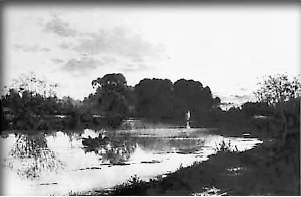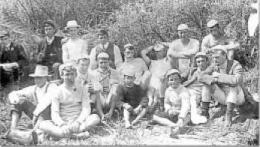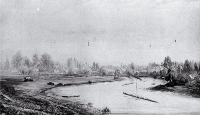Requiem for a watering hole: The Bower Hotel

The Bower Tavern has been demolished following earthquake damage. It was the most recent of several hotels which stood on the site at the corner of Bower Avenue and New Brighton Road. This is the story of the original Bower Hotel as told by local historian Richard Greenaway.
Beginnings
The original licensees of the Bower Hotel were John and Emily Paynton who had married in 1862. The couple lived on New Brighton Road - sometimes called the Old Brighton Road as it was the first route to the seaside. Their house was on land owned by farmer and carpenter, Thomas Free. The land stretched from the Avon to the New Brighton racecourse, now Queen Elizabeth II Park. The Payntons gained a wine and beer licence; of their business a licensing meeting commented: John Paynton, New Brighton, well conducted
.1
A rustic house
The dwelling was a tiny rustic … house covered with ivy
2 with, on either side of the entrance, a holly fence. In front there was an archway created from whalebones found on the beach.3 Thomas Free’s children claimed that, from a list, the Payntons selected the name Bower Hotel. It is likely that the name was chosen because the place was within a whale-bone bower.4 People called the waterhole the Old Brown Cow. Rowing men, dry as a wooden joss
5 consumed strawberries and cream, wine or a long draught of nut brown ale
served in a homely style
.6 At the Brown Cow a dip in the Avon was indispensable
.7. The hotel was in the front room of the house. There was no bar and customers sat when drinking. A silent clock bore the slogan No tick
and the rhyme:
My liquor is good, my measures are just,
I keep no books, I give no trust.
I have trusted many to my sorrow.
Try today and trust tomorrow.8
A new bridge brings business
In 1874 a group of businessmen including George Oram, former Christchurch Mayor, William Wilson and Ferry Road storekeeper Joseph Harrop Hopkins sought to shorten the trip to New Brighton by building a bridge at the eastern end of the embryonic Wainoni Road. On opening day Sir John Cracroft Wilson, the Nabob
, and provincial secretary, H. R. Webb, drove across the bridge in a trap. This was the first bridge east of Stanmore Road. The existence of the bridge expanded the Payntons’ customer base. When the Volunteers practised military manoeuvres in the area, newspapers described the structure as Paynton’s bridge.9
Bad luck for the businessmen
The businessmen who built the bridge came to grief. Hopkins was bankrupted. Wilson, a wife-beater and, in the civil courts, exposed as swindler of an estate, was a pariah.10 George Oram died of cirrhosis of the liver. Black-plumed horses had borne his coffin from the New Brighton Hotel to the Stanmore Road bridge where it was met by the Licensed Victuallers’ Association, a firing party and the band of the Canterbury Yeomanry Cavalry. The latter played the Dead March in Saul and the deceased’s horse, appropriately caparisoned, led the way to the Barbadoes Street Cemetery.11

Exit the Payntons
In 1882 Emily Paynton was thrown from a cart.12 This may have contributed to the couple’s decision to abandon the hotel. Pressure may also have come from Thomas Free who, fancying himself in charge, asked that the Avon Licensing Court grant a full publican’s licence.13 In 1884 Emily took over New Brighton Road picnic grounds, The Pines, a little below Baker Street. She told the public that she could provide tea, coffee and other refreshments, and that special arrangements could be made for pleasure and picnic parties for the use of the grounds. A saloon could be hired for entertainment.14 John Paynton, 90, died in August 1898. Emily, 80, died in March 1904. The couple were buried in the Linwood Cemetery.
Thomas Free Junior
Thomas Free Junior took over the hotel. He provided the strawberries and cream menu, adding whitebait, teas and a tot of … rum straight from the barrel and well over-proof
.15 He built a substantial hotel and provided lodgings for travellers and stables for their horses. During coroners’ inquests at the hotel, with juries and the judiciary present, Thomas provided refreshments.16
Hunting and fishing
Thomas built a jetty in front of the hotel. Using worms as bait, children caught eels which reached from a man’s shoulder to the ground.
Whitebait was sold at sixpence a quart. The hunt club brought its dogs. Thomas’s sons dragged aniseed-stained rabbit skins across the course which the dogs were to follow - and how we used to love to see them come back to be fed when rabbits were thrown up in the air for them.
17
Licensing woes
In 1894, Christchurch - with a population of 31,454 - had 55 licensed houses. Voters supported a general reduction in the number of licences.18 A June 1894 licensing committee meeting had to decide whether the Bower or Courtenay Arms, which lay many miles distant, should be shut down. Two petitions were put forward on behalf of the Bower Hotel - one by locals, the other by 200 boating men. The licensees spoke and prominent auctioneer George King supported Thomas. Thomas’ lawyer described how well the hotel was conducted, the excellent accommodation and how a first rate table was always kept
.19 The licence of the Bower Hotel was granted.20
The decline of Thomas Free
Thomas died, aged 50, on 30 November 1894, after a long and painful illness.
21 Many people attended the funeral. Thomas’s widow Sarah Ann became licensee but fell ill. While the hotel remained the property of the Free children, the licence was passed to George Henry Pierce. Sarah Ann Free, 48, died on 8 July 1895. 22. A daughter, Eliza Catherine, 11, had died on 19 September 1888. 23. Thomas, Sarah and Eliza Free are buried in the Burwood Anglican Cemetery. 24
Drunkenness …

New Brighton was a wide, wild, country area served by two licensed premises — the New Brighton and Bower hotels. Until the beginning of the 20th century, there was no local policeman to enforce the rules. There was drunkenness. In 1968 David Florance recalled his uncle, local farmer John Kerr: … otherwise the ‘Big Fellow’ … a very Viking, hairy-chested, a reddish spade beard, magnificent as he guided his team of horses along the furrows; a man bursting with vitality except when horse and sulky brought him home from the Bower
.25
Sometimes this had criminal consequences. In 1904, William Clinton, a well-to-do [Darfield] farmer
, was taken, drunk, to the Bower. Licensee Frank Mulholland refused to hand him to his minders. During the night, the visitor wrote cheques worth 150 pounds($24,469). A magistrate called this a case of lambing down
. ‘Lambing down’ was the practice where a worker gave his cheque for the season to a publican. The publican would supply him with alcohol till the value of the cheque had run out.
Mulholland, no longer licensee, was fined 20 pounds($3,262), costs and four pounds($652) witnesses’ expenses.26
The end of the first hotel
Between 2 and 3 a.m. on 16 November 1908, fire consumed the Bower and its contents; a concrete horse trough alone remained. The hotel was insured for 400 pounds($62,599) in the Imperial Fire Office, and the contents for 420 pounds($65,729) in the Liverpool and London and Globe Office. 27
After the fire, a temporary bar was run from the Burwood hall. A new hotel was built 16 chains (321m) east of the old structure, on the New Brighton Road-Racecourse Road corner, and operated until its demolition in 2011.28
Sources
Archives
- Avon Road Board archives, Christchurch City Council Archives, Christchurch
- Canterbury Provincial Archives, Archives New Zealand, Christchurch
- Christchurch City Council scrapbooks, Christchurch City Council Archives
- Liquor Licensing Archives, Archives New Zealand, Christchurch
- Will of Thomas Free, Archives New Zealand, Christchurch
Books
- Campbell, Bruce Manson All Saints’ churchyard, Parish of Burwood 1979
- Greenaway, Richard Burwood, All Saints’ church, 1877-1977 1977
- Greenaway, Richard Rich man, poor man, environmentalist, thief 2000
- North New Brighton Residents’ Association North New Brighton 1954
- Walsh, George W. New Brighton, a regional history 1971
Manuscripts
- Canterbury Pilgrims’ and Early Settlers’ Association Early Christchurch and Canterbury Scrapbook of newspaper clippings 1923-1950.
- Entries on Thomas Free, John Paintin, Joseph Harrop Hopkins, William Wilson and George Oram in G.R. Macdonald dictionary
- Free family reminiscences held by Richard L.N. Greenaway
- Owles, Alfred William New Brighton Scrapbooks Christchurch City Libraries
- Taylor, W. A. Manuscripts Canterbury Museum
On-line
- New Brighton Silver Band
- New Zealand. Department of Internal Affairs, Births, deaths and marriages index
- Papers past: NZ Truth, Star
Footnotes
1. Christchurch annual licensing meeting, Star, 8 May 1872 p 2
2. Greenaway, Richard, Rich man, poor man, environmentalist, thief, 2000
3. The lad from Tipperary: Tom Gray’s reminiscences, Star, 31 May 1919 p 8
4. Free family reminiscences
5. Reminiscences of New Brighton: its early history, Star, 27 April 1896 p 2
6. Hotels information file
7. New Brighton memories: No. 1, Star, 5 February 1895 p 2
8. Free family reminiscences
9. The Volunteers, Star, 25 May 1888 p 3; The operations at New Brighton, Star, 26 May 1885 p 3
10 Supreme Court, Star, 17 July 1876 p 2, 18 July 1876 p 2, 19 July 1876 p 2, 20 July 1876 p 2-3, 21 July 1876 p 2-3
11. Military funeral, Star, 7 April 1876 p 2
12. Local and general, 8 December 1882 p 2
13. Licensing court. Avon, Star, 21 March 1882 p 3
14. Advertisement, Star, 9 April 1884 p 1
15. Hotels information file
16. See, for example, the inquest on the body of Enoch Barker: Found drowned, Star, 18 January 1892 p 4
17. Free family reminiscences
18. Licensing in Christchurch, Star, 9 April 1894 p 3; Christchurch licenses, Star, 26 May 1894 p 4
19. Liquor Licensing Archives
20. Local and general, Star, 23 June 1894 p 5; Licensing committee, Star, 23 June 1894 p 6
21. Deaths, Star, 1 December 1894 p 4
22. Deaths, Star, 9 July 1895 p 2
23. Campbell, Bruce Manson, All Saints’ churchyard, Parish of Burwood, 1979
24. Church register transcripts, Christchurch City Libraries; All Saints’ churchyard, Parish of Burwood
25. Greenaway, Richard, Burwood, All Saints’ church, 1877-1977, p 13
26. A lambing-down case, Otago witness, 16 November 1904 p 89
27. Fire at Burwood. Bower Hotel burnt down, Star, 16 November 1908 p 3
28. Licensing committees: Avon, Star, 8 March 1909 p 1; Licensing committees: Avon, Star, 5 June 1909 p 4

